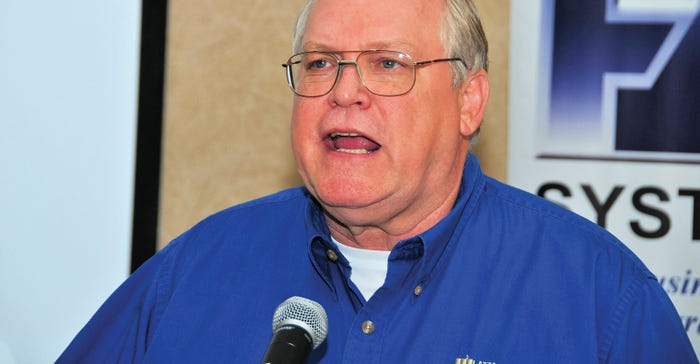March 21, 2017

By Larry Stalcup
You’ve taken advantage of better seed, better crop protectants and other technology to produce bin-busting yields. It looks like a great year. But without an expert to help plan and manage the farm’s finances, those 200-bushel corn and 70-bushel bean crops may not yield near the return you’d expect.
John McNutt, an Iowa-based MBA with the accounting firm LattaHarris LLP, says a farm’s regular bookkeeper or accountant may not possess the expertise in helping you manage the advances in production technology, correct compliance with Farm Service Agency provisions and marketing fund management.

“There can be times when a general tax accountant may not have the expertise nor desire to handle more advanced financial situations,” says CPA John McNutt.
“There can be times when a general tax accountant may not have the expertise nor desire to handle more advanced financial situations,” says CPA John McNutt.
Couple those with estate planning and management, tax planning and other areas of finance, and it’s time to start asking questions. You may need more sophisticated help in managing any number of financial situations that determine profit and loss.
Start with accrual
For starters, this requires a switch from cash accounting to accrual accounting to better measure overall expenses and revenue.
“There can be times when a general tax accountant may not have the expertise nor desire to handle more advanced financial situations,” McNutt explains. “This can involve changes in family farm ownership, equipment leases or ownership, different lender accounts for different financial needs, and numerous other direct and indirect farm management requirements.”
McNutt says that along with an operating loan, many farmers maintain separate marketing accounts to facilitate risk management through hedging. Then there’s cash flow and budget analysis, business valuations, and assistance in employee payroll management.
“It may even involve consultation with an ag accountant on how to determine your true cost of production for one or more crops, or your swine, dairy, beef cattle or poultry program,” McNutt says.
Lance Fulton agrees. He is chief accounting officer for Foreland Ag, Garden City, Kan., which has farm operations in Nebraska and Kansas. Fulton notes that most in production ag view accounting as a necessary evil.
“They do it for their taxes and their lenders,” he says. “I take the approach that your financials are no different than your cropping. You have a crop in the field that provides short-term income. For the long-term, it’s about your soil health and your management skills for working your farm.
“You also have short-term help for doing your taxes, but long-term financial management requires an accountant with expertise needed to mine your overall financial data and calculate the long-term effects of your decisions.”
Triggering events
There are many unforeseen events that can require more advanced financial planning. “It may be an untimely death in the family or another situation in which you have to make a transition in ownership or management,” McNutt says (see story on Page 22 of the March, 2017 issue).
“When breaking in the next generation, you want to make sure your business can handle that financially. Can the business generate an extra living and/or a retirement for the senior generation? Those may be things a general tax accountant may not be able to answer.
“That’s where the accountant needs to be asked, ‘Can you help me?’ If no, it may be time to start looking for someone with more knowledge and skill to help you run your business better.”
In today’s competitive world, McNutt points out there is more incentive for producers to do a better job of measuring profit margins and determining how they can grow their crop or livestock operation.
“Agricultural production is much different than it was 20, or even 10 years ago,” he says. “Producers and feeders should look at what they are doing now with technological advances in production.
“Farmers usually know their production is strong, but at the same time, feel like the world is changing around them. They ask themselves, ‘Are we actually being competitive? How well are we doing? Are we structured financially?’
“That’s a time in which a more sophisticated accounting system may be needed from an accounting professional with specific expertise. I’m seeing those in advanced level of operations excelling because they are using more financial and accounting information to evaluate where they’ve been and forecast where they’re going. They are using information to reach that goal.”
Cost of expertise
You get what you pay for, says Fulton. “Accounting firms or part-time controllers aren’t going to be free,” he says. “Producers can expect to pay $150 to $175 per hour — and even $250 — for a tax accountant. A similar rate can be expected for an accountant with expertise in specific areas.
“But more time will likely be needed to accumulate data and assemble it into a product you can present to a banker with all he needs to know. It’s also a product you can put in front of your family to show the farm’s history and where it’s headed.
“Having someone who can take all of your information and give you the result of full financial health can be very valuable.”
Stalcup writes from Amarillo, Texas.
You May Also Like




